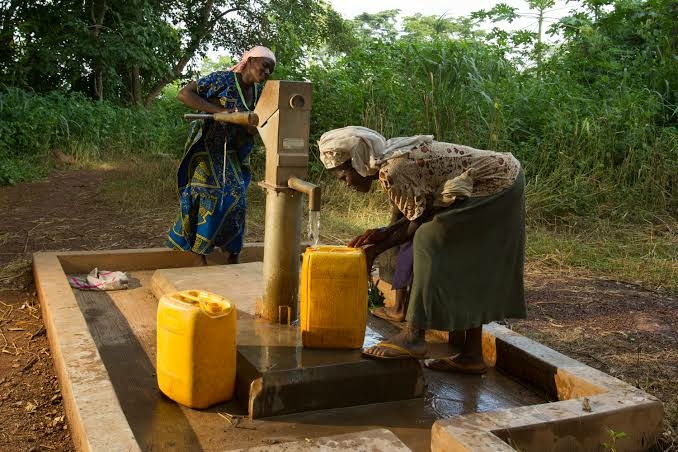In Banche community, Joda Local Government Area, Adamawa, it is not unusual for children to suddenly fall ill. After several investigations, it was discovered that the situation is not unconnected to the water they drink.
Halilu Abubakar a resident of the area said his son was a victim.
“My son always sick after drinking from uncovered wells in the community”, he said.
Abubakar is the chairman of the community’s The Water Sanitation and Hygiene Committee (WASHCOM).
WASHCOM is project is an initiative of UNICEF which has provided a hand-pumped borehole to areas in dire need of potable water.
Abubakar said he has not had reason to take his son to hospital again after the borehole was sank in the area.
Money saved from no longer paying medical bills have to be diverted to other areas of family needs.
The situation is not limited to Banche. A similar scenario is obtainable in Angwar Alhaji Magaji community in Sandamu LGA in Katsina State,
According to Malam Aliyu Hussaini, the WASHCOM chairman in the area bad source of water supply and management in the areas has been a source of concern for the residents.
He said lives had been lost and sources of livelihood threatened as residents of the area sought sought to ameliorate the plight and minimise casualty figures and destructions.
“Some community members of the community have lost one or two people due to the outbreak of disease such as cholera, typhoid and malaria, pregnant women and children are even more vulnerable to the crisis.
“Many children don’t go to school as regularly as they should because of the search for water for their family use.
“They go in search for water in the morning and when they return from the search, time for school has gone.
“Even animals were not spared,’’ he said as he enumerates what the community has had to pass through in the face of lack to potable water supply.
In 2019 the Federal Government inaugurated the National Strategy for the Implementation of Village Level Operation and Maintenance (VLOM) of rural water supply facilities to ensure community participation and ownership in operation and maintenance of water facilities.
To Hussaini and others, with the introduction of (VLOM) many communities such as his are beginning to own and manage their water facilities themselves.
A 2021 Water Sanitation and Hygiene National Outcome Routine Mapping (WASHNORM) survey revealed that, only 53 per cent of publicly-owned water facilities are functional.
The survey also reported that 22 per cent of the publicly-owned water facilities broke down within the first one year of installation.
However, experience from pilot a project carried out by UNICEF and Tulsi Chanrai Foundation, indicated that 80 per cent of the non-functional hand pumps were repairable.
To address the challenge, in some communities, female Local Area Mechanics (LAMs) work to ensure repair of broken down boreholes, with spare parts bought from monies contributed by community members.
According to UNICEF estimates, only 72 per cent of the rural population in Nigeria will have access to improved water supply by 2030.
The UN body says achieving the SDG targets will not only require huge investment in extending the improved water coverage to currently without potable water but investing in sustainability of hand pump boreholes.
Dr Jane Bevan, UNICEF Chief of WASH, was quoted recently as saying that the public health benefits of access to potable water could not be quantified.
Bevan said sustainability of water facilities entailed permanent and beneficial change in WASH services.
For this reason, Bevan said through UNICEF interventions, 30 per cent of benefiting communities have put in place tariff system as a funding alternative for local area mechanics repairing broken facilities.
“Our belief is that boreholes should never breakdown and the sector-wide sustainability index emphasises functionality, accessibility and water quality,” she said.
The Federal Government is not ignorant of the place of quality water supply in the efforts to fight water borne diseases and build healthy communities.
To that effect, Minister of Water Resources Mr Suleiman Adamu, said the government and its partners are accelerating access to adequate and equitable supply of safe drinking water.
“Between 2016 and 2017 a VLOM pilot project supported by the European Union and UKAID was implemented in 41 selected LGAs across 12 states, 758 hand pumps and 344 solar boreholes have been repaired in these states.
“The result showed an overall 14.17 per cent improvement in the functionality of hand pumps, raising the functionality status from a baseline value of 75 per cent to 89 per cent,’’ the minister said.
WASH Programme Manager, Tulsi Chanrai Foundation, Murshed Imam, said over the years, the foundation had carried out several water projects in rural areas in Nigeria.
He said that Nigerian government and its partners’ commitment to transform the lives of Nigerians at the rural areas with VLOM is impressive.
He said since implementation of the Village Level Operation and Maintenance (VLOM) strategy in Nigeria, some communities were beginning to own and manage their water facilities themselves.
Nevertheless, Experts say the challenge for Nigeria lies in effecting a national VLOM strategy and to ensure its meticulous implementation.
They say the strategy was an opportunity to achieve 100 per cent functionality of all water infrastructure meant to realise universal and equitable access to safe and affordable water for all by 2030.

















Discussion about this post